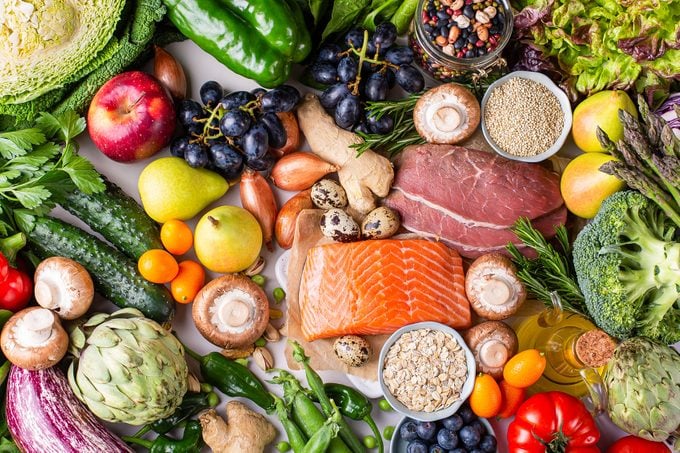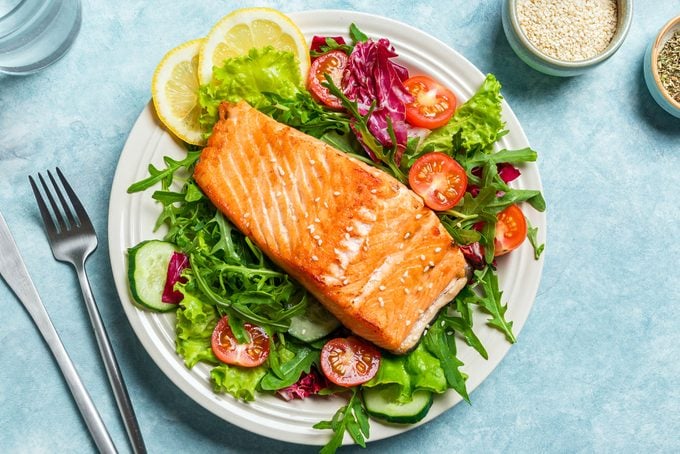The Mediterranean diet focuses on eating vegetables, whole grains, beans, fish and other foods packed with health benefits. But it's more about eating habits than a strict diet. Here's how to get started.

What Is the Mediterranean Diet? A Beginner’s Guide

Looking for ways to improve your overall health without following a rigid set of food rules? Try the Mediterranean diet, which focuses more on eating what’s good for you and less on what you can’t eat. Read on to learn about the Mediterranean diet’s health benefits, how to follow the diet, and healthy Mediterranean recipes you can make at home.
Editor’s Tip: Expand your spice cabinet and culinary creativity with a flavorful collection of Mediterranean spices.
What is the Mediterranean diet?
The Mediterranean diet is plant-focused and rich in whole grains, fruits, vegetables, legumes, nuts and olive oil. Meat and dairy are included, but in smaller amounts. Seafood is the preferred source of animal protein.
The diet is based on the traditional eating habits of people who live in countries that surround the Mediterranean Sea, such as France, Spain, Italy and Greece. Scientists began studying their eating patterns because they had less chronic disease and a longer life expectancy than people in other parts of the world—similar to the study of the Blue Zone diet.
In the late 1990s, the health community developed a formal guide to following a Mediterranean diet. The pyramid they created highlighted aspects of the diet and lifestyle that were key to gaining the health benefits people in that region have experienced for generations.
Whole foods vs. processed foods
Whole foods are also central to the Mediterranean diet, as opposed to processed foods that are high in refined grains and added sugar. The evidence against processed foods continues to stack up, as highlighted at the 2023 Academy of Nutrition and Dietetics Food & Nutrition Conference & Expo. In a session about processed foods, Megan D. Baumler, PhD, RDN, explained that ultra-processed foods are associated with an increased risk of chronic health conditions. Since they are rapidly digested and absorbed, they can also reduce feelings of fullness and lead to overeating.
A study published by the American Journal of Preventive Medicine even showed that eating too many processed foods can cause premature death.
Adhering to the Mediterranean diet will increase your intake of fiber, antioxidants and healthy fats. Eating less processed foods and more produce will help decrease sodium and ensure you’re consuming a wide variety of vitamins and minerals.
Is the Mediterranean diet good for you?
Following the Mediterranean diet means eating a variety of nutritious foods that work together to promote a healthy body. It’s often said that the Mediterranean diet is more of a lifestyle than a diet, because there’s no single food or nutrient in the diet that makes it healthy: It’s the combination that works together.
“The Mediterranean diet is one of the healthiest eating patterns and is named the number one diet in U.S. News & World Report for best diets for 2023,” says Rahaf Al Bochi, RDN, LD, spokesperson for the Academy of Nutrition and Dietetics and owner of Olive Tree Nutrition. “Research continues to reveal that the Mediterranean diet supports overall health and can help lower risk for heart disease, diabetes, certain cancers, and mortality. It has also been shown to boost mental health and support positive fertility and pregnancy outcomes.”
Benefits of the Mediterranean Diet

One of the most influential studies of the Mediterranean diet was conducted by a team at the University of Barcelona in 2013. The team followed more than 7,000 people whose heart health improved dramatically after following the diet. This study showed that the Mediterranean diet can:
- Improve blood pressure
- Maintain healthy cholesterol levels
- Reduce inflammation
- Improve digestion
- Support brain function
- Stabilize blood sugar
- Reduce the risk of metabolic syndrome
How to Follow the Mediterranean Diet
Here’s how to follow the Mediterranean diet and make it part of your daily routine.
Produce
Plant-based foods like fruits and vegetables make up the foundation of the Mediterranean diet. They are nutrient-dense and usually low in calories, providing the vitamins, minerals and fiber we need without adding a lot of calories. Fresh produce is always a great option, but frozen and canned can also be healthy choices. Read labels on packaged fruits and veggies to find those with little to no added sugar or salt.
How many servings of produce should you eat? Shoot for two servings of fruit and three servings of vegetables each day. One serving is about 1/2 cup cooked, or 1 cup raw. Focus mainly on non-starchy vegetables like bell peppers, broccoli and recipes with leafy greens, while including starchy vegetables like corn and potatoes in moderation. Try one of these bell pepper recipes to start, such as bell pepper tomato salad or grilled peppers and zucchini.
Legumes
Most legumes are rich in fiber, B vitamins, potassium and folate, and double as a good source of protein—which is important because the Mediterranean diet includes just a moderate amount of animal protein. Legumes include beans, peas, lentils, chickpeas and fava beans.
How many servings of legumes should you eat? Include three 1/2-cup servings of legumes per week. This might seem daunting if you aren’t used to eating them regularly, but consider starting with small changes like adding a handful to a salad, choosing a bean burger instead of a hamburger, or snacking on veggies and hummus (which is made with chickpeas). Look for new recipes to add to your regular rotation, like these healthy dinners that start with a can of beans or one of these chickpea recipes.
Grains
Whole grains like oats, bulgur, farro and brown rice are emphasized in the Mediterranean diet because they provide more fiber and nutrients than refined grains. They improve digestion and help stabilize blood sugar and maintain healthy cholesterol levels.
How many servings of whole grains should you eat? Incorporate three to six servings of whole grains per day, depending on your caloric needs. An example of a single serving is 1/2 cup cooked rice, one slice of bread or 1 cup dry cereal. Try switching to whole grain pasta, starting your day with oatmeal, and adding barley to soups and stews. Beyond that, our collection of whole grain dinner ideas provides plenty of ways to add them to your meal plan.
Nuts
Some of the healthiest nuts are almonds, walnuts and pistachios. They are an excellent source of healthy unsaturated fat, and also provide protein, fiber, magnesium and vitamin E. Look for low-salt or no-salt-added nuts.
How many servings of nuts should you eat? Try to get three 1/4-cup servings of nuts per week. Two tablespoons of nut butter is also a serving (so, yes, peanut butter counts!). If you’re looking for more healthy ways to eat nuts, try swapping in a serving of nuts in place of processed snacks like potato chips or pretzels to satisfy your hunger.
Meat and Seafood

Seafood is the preferred animal protein in the Mediterranean diet, and for good reason. Consuming fish regularly can help reduce the risk of heart disease and stroke, and the omega-3 fatty acids found in fatty fish can help reduce inflammation and improve cholesterol. If you eat red meat, do so in moderation, choosing lean cuts. If you eat poultry, opt for skinless poultry to limit saturated fat.
How many servings of meat and seafood should you eat? Aim for three servings of fish per week. Limit poultry to no more than one serving a day, and red meat to about one serving per week. One serving of meat or poultry is 3 ounces cooked, which is about the size of a deck of cards. Experiment with healthy fish recipes, especially salmon recipes, to increase your intake of omega-3 fatty acids.
Dairy
While yogurt and cheese are common in the Mediterranean diet, dairy is typically consumed in moderation. It can be a good source of calcium, potassium, vitamin D and protein, but it’s also often high in saturated fat.
How many servings of dairy should you eat? One serving of dairy a day can mean just 1 cup milk, 1 cup yogurt or 1-1/2 ounces cheese. Choose low-fat or fat-free when you can. Include higher fat cheeses and cream as a flavor enhancer to other, healthier foods rather than as a main part of a meal or snack.
Fats
Olive oil is key in the Mediterranean diet. It’s high in monounsaturated fat and antioxidants, which can help lower “bad” cholesterol and reduce inflammation.
How much fat should you consume? Remember that oil is also high in calories, so just one to four servings a day is optimal depending on your caloric needs. One serving is 1 tablespoon—that could be used for sauteing vegetables, dressing a salad or tossing with pasta. The difference between olive oil and extra virgin olive oil is that the latter is processed without heat, maintaining potentially beneficial phenols that are lost when processing olive oil. However, both are better choices than butter, shortening, and other oils that are higher in saturated fat like coconut oil. If you don’t usually stock your pantry with olive oil, start with one of these olive oil brands.
Wine

Wine is part of the traditional Mediterranean diet, especially red wine. While red wine was once associated with a possible reduced risk of heart disease, that’s come into question after recent studies suggest that drinking any amount of alcohol could be detrimental to blood pressure and coronary artery disease risk. It’s generally recommended that if you don’t drink, don’t start drinking. If you do drink, limit to one glass of wine per day for women, and two per day for men. One glass should be 3 to 4 ounces. After you pour a glass or two of your favorite type of red wine, put the rest of the bottle to use in one of these recipes with wine.
The Mediterranean Diet as a Lifestyle
The base of the Mediterranean food pyramid encourages being physically active and enjoying meals with other people instead of eating alone. These are core traditions of Mediterranean culture that contribute greatly to the health benefits of the diet. Lifestyle goes hand-in-hand with diet, so incremental changes in physical activity and shared meals is also incredibly important.
How to Start the Mediterranean Diet
Whenever you make big changes to your eating habits, it’s always smart to talk to your physician first to make sure the changes are right for you. Mastering new lifestyle changes can seem overwhelming at first, so start small and focus on one or two Mediterranean diet tips at a time, like these:
- Add a salad dressed with oil and vinegar before lunch or dinner.
- Instead of ending a meal with cookies, cake or ice cream, have sliced fruit with a dollop of vanilla yogurt for something sweet.
- Swap 1/4 cup almonds or walnuts for processed snacks twice a week.
- Start your day with oatmeal and berries instead of pancakes, eggs or bacon.
- If you saute in butter, switch to olive oil.
- Replace one serving of red meat with seafood once a week.
- Take a 10-minute walk after lunch or dinner every day.
If you prefer a more detailed plan, our seven-day Mediterranean meal plan gives you a week’s worth of recipes to get you started. Start by stocking your pantry with Mediterranean spices, like za’atar, saffron and sumac, and have fun experimenting with new dishes.


















